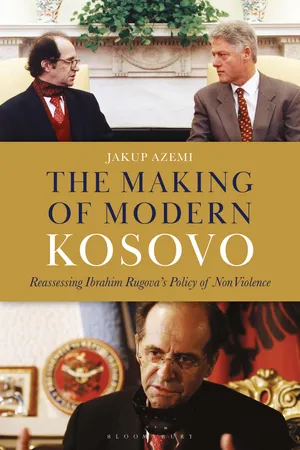
The Making of Modern Kosovo
Reassessing Ibrahim Rugova's Policy of Non-Violence
- English
- ePUB (mobile friendly)
- Available on iOS & Android
About this book
This book traces the origins and success of Ibrahim Rugova's policy of nonviolence in Kosovo between 1989–1999 and how it laid the framework for the creation of Kosovo's cultural and political identity as an independent state. Ibrahim Rugova has long been neglected in understanding how Kosovo became an independent state, with most observers concentrating on the Kosovo Liberation Army and the armed conflict of 1999 in which NATO was involved. Jakup Azemi seeks to remedy this, arguing that despite the events of 1998/99, local actors and their political organisation mattered much more than is widely recognised. Rugova's movement represented a novelty not only for the Albanians but for the whole Balkan region. He developed a vision that integrated Albanians' cultural and historical experiences into the non-violent movement and presented the Kosovan conflict to the world with a different political and cultural lens. This is a key text for scholars interested in the history of the Kosovar liberation movement, the dissolution of the former Yugoslavia; and those looking at current issues in the Western Balkans, and the Albanian-Kosovar relationship.
Frequently asked questions
- Essential is ideal for learners and professionals who enjoy exploring a wide range of subjects. Access the Essential Library with 800,000+ trusted titles and best-sellers across business, personal growth, and the humanities. Includes unlimited reading time and Standard Read Aloud voice.
- Complete: Perfect for advanced learners and researchers needing full, unrestricted access. Unlock 1.4M+ books across hundreds of subjects, including academic and specialized titles. The Complete Plan also includes advanced features like Premium Read Aloud and Research Assistant.
Please note we cannot support devices running on iOS 13 and Android 7 or earlier. Learn more about using the app.
Information
Table of contents
- Cover
- Halftitle Page
- Dedication Page
- Title Page
- Contents
- List of figures
- Preface
- Acknowledgements
- Abbreviations
- Introduction
- 1 The rise of Ibrahim Rugova and the emergence of his policy of non-violence
- 2 Non-violence and Albanian culture
- 3 The institutional set-up: The parallel state of Kosovo
- 4 The internationalization of the Kosovo conflict
- 5 Transformation from a non-violent to violent conflict
- 6 The epilogue
- 7 Conclusion: Rugova’s political legacy
- Notes
- Bibliography
- Index
- Imprint